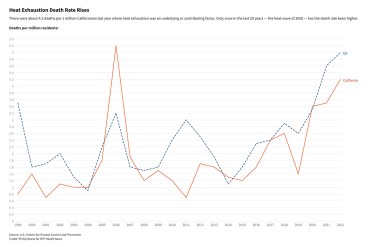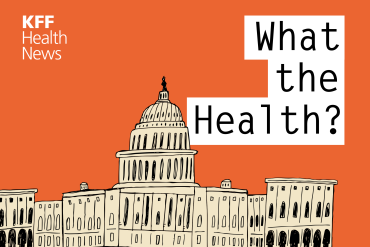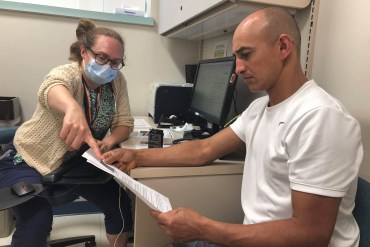Por qué los CDC recomiendan el nuevo refuerzo contra covid para todos
El Comité Asesor sobre Prácticas de Inmunización de los CDC votó 13-1 a favor de la moción después de meses de debate sobre si limitar los refuerzos a grupos de alto riesgo.
Why the CDC Has Recommended New Covid Boosters for All
As covid-19 hospitalizations tick upward with fall approaching, the CDC says it’s time for new boosters — and not only for those at highest risk of serious disease. Here are seven things you need to know.
A pesar de las amplias recomendaciones para el refuerzo anticovid actualizado publicadas el otoño pasado, sólo el 17% de la población la recibió, y alrededor del 43% de las personas de 65 años o más.
Pfizer and Moderna Are Pushing the New Covid Booster. Should You Get It? The CDC Is About to Decide.
Chances are, if you aren’t older, chronically ill, or obese, you don’t need a forthcoming covid vaccine to stay out of the hospital. But it probably wouldn’t hurt.
In Move to Slash CDC Budget, House Republicans Target Major HIV Program Trump Launched
Republicans in Congress have proposed substantial cuts to the budget of the Centers for Disease Control and Prevention, taking aim at one of former President Donald Trump’s major health programs: a push to end the HIV epidemic in the U.S.
Heat-Related Deaths Are Up, and Not Just Because It’s Getting Hotter
Excessive heat contributed to 1,670 deaths nationwide last year, according to federal data — the highest rate in at least two decades. An increase in drug use and homelessness, along with hotter temperatures, were among the reasons.
What the Health? From KFF Health News: Welcome Back, Congress. Now Get to Work.
Congress returns from its summer recess with a long list of tasks and only a few work days to get them done. On top of the annual spending bills needed to keep the government operating, on the list are bills to renew the global HIV/AIDS program, PEPFAR, and the community health centers program. Meanwhile, over the recess, the Biden administration released the names of the first 10 drugs selected for the Medicare price negotiation program.
‘Like a Russian Roulette’: US Military Firefighters Grapple With Unknowns of PFAS Exposure
Federal research linking “forever chemicals” to testicular cancer confirms what U.S. military personnel long suspected. But as they seek testing for PFAS exposure, many wonder what to do with the results. There’s no medical treatment yet.
Sin mantas, peluches, ni en brazos de sus padres: cómo hacer que los bebés duerman seguros
Algunas advertencias claras: los bebés no deben dormir con mantas, peluches o protectores que puedan provocar asfixia o estrangulamiento. Tampoco en brazos de los padres.
Cozy Images of Plush Toys and Blankets Counter Messaging on Safe Infant Sleep
Unsafe sleep environments are among the main reasons accidental suffocation or strangulation is a hard-to-solve public health problem.
No existen normas federales para proteger a los trabajadores cuando los días son excesivamente calurosos. Y sin el apoyo bipartidista del Congreso, incluso con la atención urgente de la administración Biden, es posible que el alivio no llegue en años.
Workers Pay the Price While Congress and Employers Debate Need for Heat Regulations
Studies suggest official numbers vastly underestimate heat-related injuries and illness on the job. To institute protections, the government must calculate their cost — and the cost of inaction.
NPR and KFF Health News Share the Story of Two Health Heroes Who Helped Stop Smallpox
Regina G. Barber from NPR’s “Shortwave” podcast speaks with physician-epidemiologist Céline Gounder about two men who were among the public health heroes who helped wipe out a 3,000-year-old virus, and the lessons that victory offers for the next public health emergency.
La publicación fue escrita por el activista anti-vacunas Steve Kirsch, quien ha hecho otras afirmaciones sobre las vacunas que han sido desacreditadas por PolitiFact y otros verificadores de datos.
When Temps Rise, So Do Medical Risks. Should Doctors and Nurses Talk More About Heat?
The medical dangers of heat are real. But people often ignore public heat alerts or don’t realize how vulnerable they are. A new alert system prompts clinicians to talk about heat with patients.
Activist Misuses Federal Data to Make False Claim That Covid Vaccines Killed 676,000
Anti-vaccine tech entrepreneur Steve Kirsch, whose wild assertions have been repeatedly debunked, wrongly attributes deaths following vaccination to the vaccines themselves. The Centers for Disease Control and Prevention, which runs the database, calls that inaccurate and irresponsible.
How Far Will Montana’s Push to Remove Lead from School Drinking Water Go?
Montana has earmarked $3.7 million to address widespread high levels of lead in school drinking water. But it likely isn’t enough to solve the problem.
Epidemic: Speedboat Epidemiology
In Bangladesh, smallpox eradication workers went to great lengths to vaccinate even one person, sometimes traveling by speedboat, crossing rickety bamboo bridges or leech-infested paddy fields. Episode 4 of the “Eradicating Smallpox” podcast is about what it takes to bring care directly to people where they are.
More Cities Address ‘Shade Deserts’ as Extreme Heat Triggers Health Issues
Where trees are growing — and who has access to their shade — affects health and well-being, especially in one of the hottest states in the country.
Los adolescentes publican en Facebook, Instagram, Snapchat o TikTok, fotos o videos de sí mismos con armas y montones de dinero, a veces desafiando a sus rivales. Cuando los mensajes se hacen virales, alimentados por los “likes” y los comentarios, el peligro es difícil de contener.























